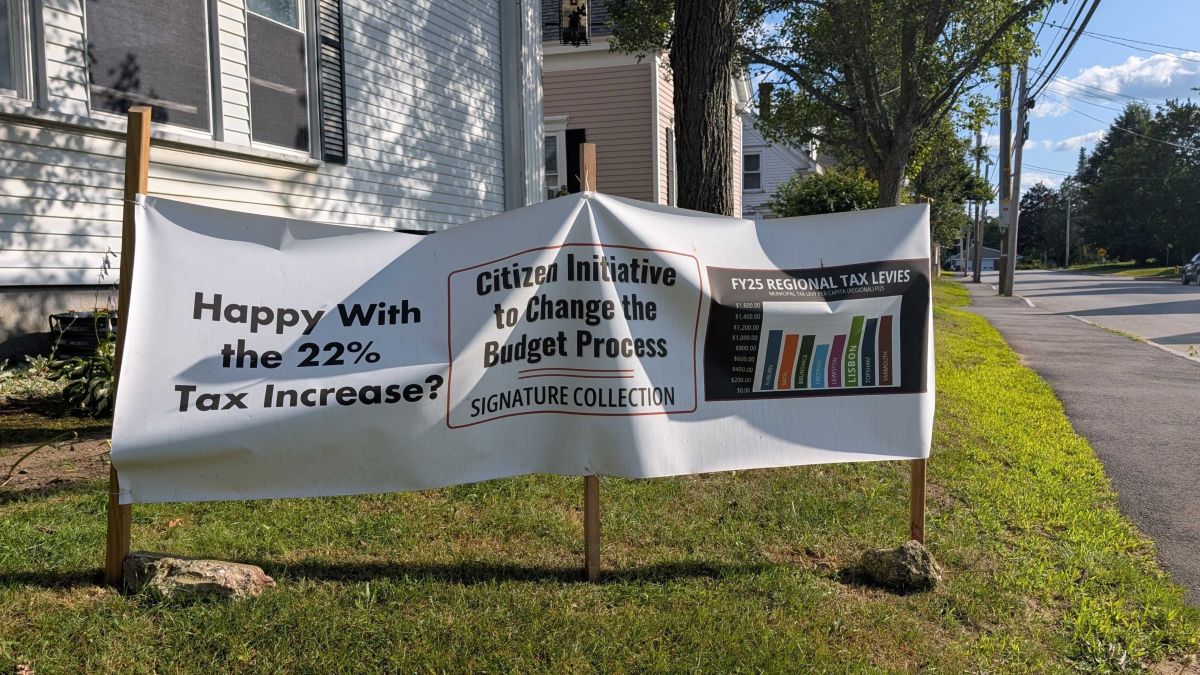Lisbon residents are set to vote on a $21.3 million school budget for the second time on August 5, the latest installment in a heated budget debate that has gripped the small community this summer.
As tensions in the town of 9,700 have mushroomed, locals angry about rising taxes have pushed for town councilors to be recalled and put forward a proposal to change the town charter so residents have a greater say over the budget process.
Voters rejected the school budget by a wide margin, 724-312, in June, citing frustration over a town budget that was slated to increase the town’s tax levy by around 20 percent. Residents do not vote on the municipal budget, so many used the school vote to express their discontent.
Turnout was around 16 percent, high for a school budget vote, and was driven in part by mailers from the Renew the American Dream PAC, a political action committee run by former state representative and congressional candidate Dale Crafts, who lives in town.
The PAC spent over $2,000 campaigning against the budget, with mailers proclaiming, “It’s time to rein in spending. Tell the Town Council and the school board to go back to the drawing board.”
Council member Chris Camire said the mailers “certainly influenced the outcome,” and got locals to vote down the budget in protest of high taxes. Since the vote seemed to reflect general tax discontent rather than issues with the school’s budget, the Lisbon School Committee declined to make any cuts. Instead, it sent the proposal back to the town.
“The turnout to vote down the school budget wasn’t actually against the school budget, it was against the Town Council,” Camire said.
Lisbon’s budget battle stems in part from an effort to address accounting errors that were discovered last summer, as well as increasing inflation and years of high spending. The town opted not to increase taxes last year, which meant that it instead dipped into its general fund.
“It’s actually two years of increases because you didn’t raise taxes the prior year,” Town Manager Glenn Michalowski said.
Compounding the problem, the town had drastically overestimated just how much money it was collecting. A clerical error on a state form double-counted parts of the town’s revenue. Lisbon had around $2 million less than the form had stated, a gap that was filled by again dipping into the general fund.
In March, the town manager said that for councilors to get everything they had requested, the budget would need to increase by about $6 million, which could have led to a roughly 45 percent increase in the town’s tax levy.
After budget workshops and public input, Michalowski put forward a “bare bones” $13.9 million budget. It axed new spending and eliminated some funding for parks, libraries and other town services.
The total was down from the prior year’s $14.6 million budget, but because town councilors were opting not to spend the general fund balance it would still require an increase in the tax levy. With the proposed school budget included, that could be an increase of around 20 percent.
“We knew this was going to be the painful year, but we decided to sort of rip the band-aid off and just say, ‘zero use of fund balance,’” council member Nicholas Craig said. “This is trying to correct the course without continuing large increases year-over-year.”
At a June 17 council meeting, that budget failed.
“These cuts are too deep, it’s going to set us on our heels,” said council member Jeremy Barnard before the vote, adding that he would not support a budget with less than a 12 percent increase over the prior year.
The next day, a small group of residents began pushing to recall Barnard and the council chair Fern Larochelle. Barnard, who was elected in November, resigned rather than fight the recall. Larochelle’s recall was later dismissed on technical grounds. The town’s finance director also decided to resign.
On July 1, the town council passed its $13.9 million budget, mostly unchanged from the mid-June vote.
To some on the council, the decision to avoid using the general fund balance to offset taxes is strategic.
“We’ve got a plan for five years, ten years down the road, not just what feels good right now,” Craig said.
But some locals believe the council has been ignoring pleas for lower spending, and submitted a petition that would give townspeople the power to approve town budgets in a referendum.
Frustration boiled over at a special meeting on July 22, called to address the petition.
“We’ve got a spending problem. You guys know that,” one resident said during the public comment period. “Cut what we can cut, get rid of the things we don’t need, and start looking to the future for our children that can have a town that they can live in, that they’re not burdened by taxes.”
At several points during the meeting, the chair lost control as some of the roughly 45 residents in attendance began shouting their grievances.
“We made very clear how we felt about the budget to begin with,” another resident said. “However, on vote, y’all passed it anyway. So, don’t sit there and tell us that y’all listen to us because that doesn’t hold water.”

The petitioners’ proposal offered a stark change: an amendment to the town charter that would force a public referendum on the town budget. If such a referendum failed twice, the previous year’s budget would automatically be reduced by 33 percent and adopted, which was meant to incentivize the town manager to put forward conservative budgets.
Charlie Turgeon, a resident who spearheaded the petitioners’ campaign, said the 33 percent cut would get the town budget to be roughly level with those of nearby towns of similar sizes. (He cited Yarmouth and Bath, which both have a larger gross budget than Lisbon’s.)
That proposal sparked a debate over what kind of change would be required to the town charter. If it was deemed an amendment, it could be passed through a public vote; if it was considered a revision, it would require a much longer process.
Over the outrage of some petitioners, the council decided that the change was too broad to be considered an amendment, arguing that the 33 percent cut provision could have forced the town to eliminate core services or violate contractual obligations.
In November, the town will vote on whether to create a commission tasked with reviewing the charter to start the revision process.
Turgeon had planned to challenge the decision in court, but the day after the meeting he changed course. In an email to fellow petitioners and the town council, he announced his intent to campaign for the charter revision and to run for a seat on the council.
“My focus now is on helping fix the charter through a commission, ensuring it protects our most vulnerable while welcoming sustainable growth,” he wrote. “I invite you to join me in this effort — through dialogue, ideas, and action.”
Craig, who was elected to the council last November, acknowledged the petitioners’ criticism and said he hopes to find cost efficiencies in the future.
“It’s entirely possible that we have purchased things in the town that you could have maybe either spent less money on or had more strategic planning in its purchase,” he said. “That being said, in my time on Council, I’ve been pretty impressed. As a resident of the town I’ve been pretty impressed with the services we provide and the cost to do so.”







